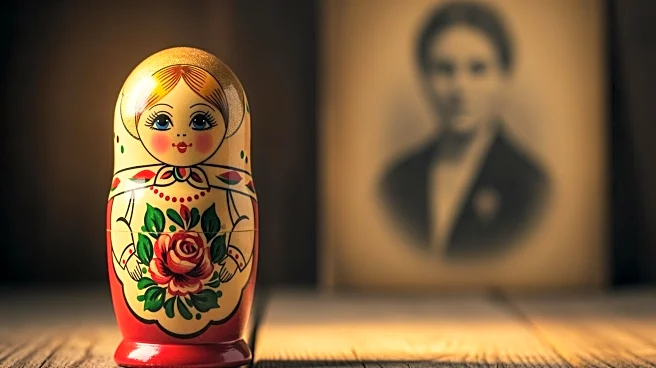What's Happening?
Julia Ioffe, a Russian American journalist, has released a new book titled 'Motherland: A Feminist History of Modern Russia, from Revolution to Autocracy.' The book, which is a finalist for the National
Book Award, offers a feminist perspective on the 20th-century history of Russia, focusing on the stories of influential but lesser-known women. Ioffe, who immigrated to the United States from Moscow in 1990, explores the roles and achievements of women in Soviet Russia, including those in her own family. The book highlights the contradictions faced by women in Soviet society, where they were expected to be both professional achievers and fulfill traditional domestic roles.
Why It's Important?
The release of 'Motherland' is significant as it sheds light on the often-overlooked contributions of women in Soviet history, challenging the male-dominated narratives that have traditionally defined Russian history. By focusing on women's stories, Ioffe provides a new lens through which to understand the social and political dynamics of the Soviet era. This perspective is crucial for understanding the broader implications of gender roles and feminist movements in historical contexts, offering insights into how these dynamics continue to influence contemporary society. The book's feminist angle also contributes to ongoing discussions about gender equality and the recognition of women's roles in shaping history.
What's Next?
The book's reception and its impact on historical discourse will likely prompt further exploration and discussion of women's roles in other historical contexts. Scholars and readers may be inspired to re-evaluate other historical narratives with a focus on gender, potentially leading to a broader re-examination of history from a feminist perspective. Additionally, the book may influence future works in both academic and popular history, encouraging authors to incorporate more diverse voices and perspectives in their narratives.
Beyond the Headlines
Ioffe's work also touches on the ethical and cultural dimensions of historical storytelling, highlighting the importance of including marginalized voices in historical narratives. By bringing attention to the stories of women who have been historically sidelined, 'Motherland' challenges readers to consider the biases and omissions in traditional historical accounts. This approach not only enriches the understanding of Soviet history but also encourages a more inclusive and comprehensive view of history as a whole.









